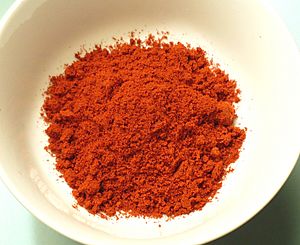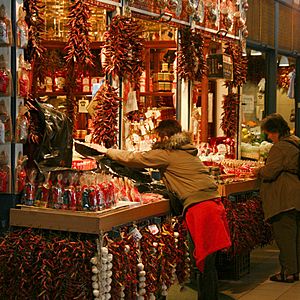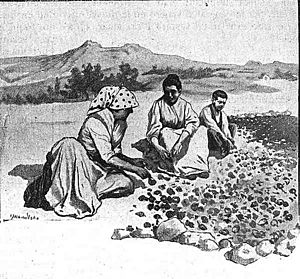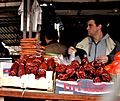Paprika facts for kids

A small bowl of smoked Spanish paprika, called pimentón in Spanish
|
|||||||
| 282 kcal (1181 kJ) | |||||||
|
|||||||
Paprika is a popular spice made from dried red peppers. It comes from the Capsicum annuum plant. These peppers are often called bell peppers or sweet peppers. Sometimes, hotter peppers like chili peppers or cayenne pepper are added to make spicier paprika. In many languages, the word paprika also means the plant and the fruit itself, not just the spice.
Paprika first came from Central America, especially Central Mexico. People there have grown these peppers for hundreds of years. In the 16th century, paprika was brought to Spain. Today, this seasoning is used to add both flavor and color to many dishes. You can find it in foods from Argentina, Spain, Morocco, and Hungary.
The use of paprika spread from Spain to Africa and Asia. It then reached Central Europe through the Balkans, which were ruled by the Ottoman Empire at the time. This is why the English word "paprika" comes from Hungarian. In Spanish, paprika has been called pimentón since the 1500s. It became a key ingredient in the cooking of western Extremadura, a region in Spain. Even though it was in Central Europe early on, paprika only became really popular in Hungary in the late 1800s.
Paprika can be mild or very hot. Its flavor also changes depending on where it's grown. Most paprika plants produce the sweet kind. Sweet paprika is mostly made from the outer part of the pepper. Hot paprika includes some seeds, stems, and other parts of the pepper. The red, orange, or yellow color of paprika comes from natural colors called carotenoids.
Contents
History of Paprika
Paprika plants first grew in the wild in Central Mexico. People living there have grown them for many centuries. These peppers were later brought to the "Old World" (Europe, Asia, and Africa) when they arrived in Spain in the 1500s.
The plant used for Hungarian paprika was grown by the Turks in 1569. This was in Buda, which is now part of Budapest, the capital of Hungary. For a long time, paprika in Central Europe was quite hot. But in the 1920s, a farmer in Szeged, Hungary, found a plant that grew sweet peppers. He then used this plant to grow more sweet paprika.
The word paprika was first used in English in 1896. However, there was an earlier mention of "Turkish paprika" in 1831. The word comes from the Hungarian word paprika. This is a smaller version of the Serbo-Croatian word papar, which means "pepper." That word, in turn, came from the Latin word piper or the modern Greek word piperi. Similar words like peperke and piperke are used in different Slavic languages for bell peppers.
How Paprika is Made and Its Types

Paprika is made in many countries around the world. These include Argentina, Mexico, Hungary, Serbia, Spain, the Netherlands, China, and parts of the United States.
Hungary is well-known for its paprika. Hungarian paprika comes in different types:
- Noble sweet (Édesnemes) – This is slightly spicy and bright red. It's the most common type sold to other countries.
- Special quality (különleges) – This is the mildest type. It's very sweet and has a deep, bright red color.
- Delicate (csípősmentes csemege) – A mild paprika with a rich flavor. Its color can be light or dark red.
- Exquisite delicate (csemegepaprika) – Similar to delicate, but a bit spicier.
- Pungent exquisite delicate (csípős csemege, pikáns) – An even spicier version of delicate.
- Rose (rózsa) – This type has a strong smell and is mildly spicy. It is pale red.
- Semi-sweet (félédes) – A mix of mild and spicy paprikas, so it's medium hot.
- Strong (erős) – This is the hottest paprika. It is light brown.
Spanish paprika, called pimentón, comes in three main types:
- Mild (pimentón dulce)
- Mildly spicy (pimentón agridulce)
- Spicy (pimentón picante)
The most famous Spanish paprika is Pimentón de la Vera. It has a special smoky flavor and smell. This is because the peppers are dried by smoking them, usually over oak wood. Another type, Pimentón de Murcia, is not smoked. It is traditionally dried in the sun or in special ovens.
How Paprika is Used
Cooking with Paprika
Paprika is used in many dishes all over the world. It is mainly used to flavor and color foods like rice, stews, and soups, such as goulash. It's also used in making sausages, mixed with meats and other spices. In the United States, people often sprinkle paprika on food as a decoration. However, its flavor becomes much stronger and better when it is heated in oil.
Some famous Hungarian dishes that use paprika include gulyas (goulash), which is a meat stew. Another is paprikash (paprika gravy), a Hungarian recipe with meat or chicken, broth, paprika, and sour cream. In Moroccan cuisine, paprika (called tahmira) is usually mixed with a little bit of olive oil.
Images for kids
-
Paprika pepper farmer in Tanzania
-
Red peppers in Cachi, Argentina are air-dried before being processed into powder.
-
Smoked paprika, called pimentón in Spanish
See also
 In Spanish: Pimentón para niños
In Spanish: Pimentón para niños
 | James Van Der Zee |
 | Alma Thomas |
 | Ellis Wilson |
 | Margaret Taylor-Burroughs |







